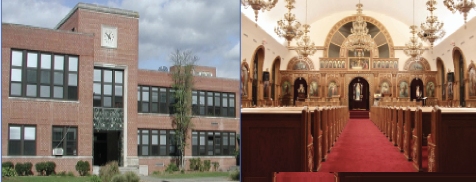Balancing between two worlds
The struggle of voicing an opinion that will be accepted on either side of the political spectrum

Photo photos courtesy of westfieldnjk12.org & St. Mary Coptic Orthodox Church
I pull out of my driveway and head to the parkway. I drive five miles, turn onto Route 1, exit 15 miles later and after a few side streets, I turn into my church parking lot.
This is the 45-minute drive I make several times a week whether it’s to attend weekly mass or youth group. This is the drive I have to complete in order to balance my two sets of values and beliefs.
As a Coptic Orthodox Christian living in a predominantly white, liberal community, I often grapple to reconcile the distance that divides my two worlds. Every weekday I go to school and I am immersed in one community: the liberal, progressive and secular one. Then, every weekend I drive to another community: the conservative, traditional and religious one.
Often, I find there are commonalities. Both communities have strong beliefs, a solid set of morals, and in a debate, neither will back down. But both claim to be starkly different from the other. My church calls the other naive, illogical and radical and my school fires back with racist, old-fashioned and selfish. However, their passion is the same.
As a member of both communities, I’m often considered to be the “other” in terms of my beliefs, religion and moral philosophy. In my church I’ve been ridiculed for my strong feminist beliefs. During a discussion about women’s role in the church, whenever I offered a different perspective, I would hear laughter and see eyes roll. In my school, I’m ostracized for my “odd” religion. Even my friends have looked at me weirdly when I’ve told them that the only man I plan to kiss is my husband.
Like most teenagers, I’m still struggling to find my identity — to figure out what exactly I believe in. The last thing I need or want is for my closest confidants in either community to judge me as I try to mature and develop my beliefs.
In the case of abortion, I am pro-choice, but anti-abortion. Somehow, I still get backlash in both of my communities. My church condemns me for putting a baby’s life on the line and my peers call me a misogynist.
What both sides don’t understand is that this perspective is a product of my upbringing. I’ve been exposed to both sides and have concluded that while any woman thinking about abortion should rethink her options, it’s ultimately not my decision to make.
Now, I’ve started to keep my mouth shut. Whenever I hear a piece of theology I disagree with, I’ve swallowed my argument in fear of being chastised or laughed at. At lunch, if there is ever political discussion, I’m silent because I know I’ll be judged if I tell my truth.
How is this fair? I should not be afraid to voice my opinion. As a citizen in two worlds, I should be accepted for who I am and not try to be who others want me to be. My opinions are a product of my upbringing in both communities. So I will take a little piece of each with me as I journey on to my two worlds.
